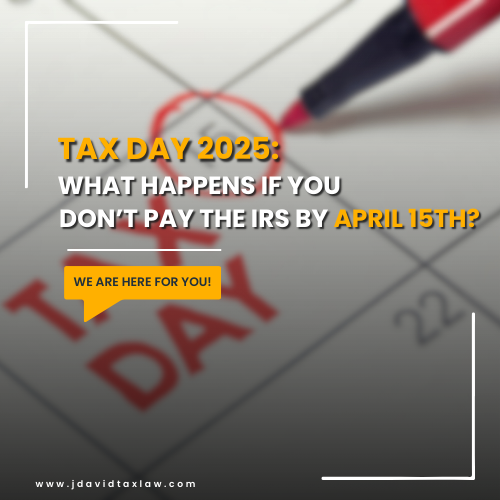Failing to pay your federal taxes by the April 15, 2025 deadline, also known as Tax Day, triggers IRS penalties right away. The failure-to-pay penalty is 0.5% of the unpaid tax for each month (or part of a month) that the balance remains unpaid, capped at 25% of the tax due. This rate can increase to 1% per month if the IRS has sent a final notice of intent to levy and you still haven’t paid within 10 days. On the other hand, if you filed your return on time and set up an installment payment plan, the IRS reduces the failure-to-pay penalty to 0.25% per month during the payment plan.
Importantly, the failure-to-file penalty for not filing your return is much steeper than the failure-to-pay penalty. It’s typically 5% of the unpaid tax per month (or part of a month) late, up to a maximum of 25%. If you also failed to file by the deadline, these two penalties can stack. In fact, after five months, the combined penalty rate can hit its cap (a maximum of 47.5% of the tax – 22.5% from late filing plus 25% from late payment). The IRS also imposes a minimum late filing penalty if your return is over 60 days late – for 2025, this minimum is the lesser of $510 or 100% of the tax owed
Mounting Interest on Unpaid Taxes
In addition to penalties, the IRS charges interest on any unpaid tax balance starting from the April 15 due date. This interest accrues daily and is compounded daily on the accumulating balance (tax plus penalties and prior interest). The interest rate isn’t static, it’s adjusted quarterly based on federal short-term rates. For example, in early 2025 the interest rate on underpayments is 7% per year, compounded daily. This means each day interest is calculated on the previous day’s balance (which includes prior interest), causing your debt to grow faster the longer it remains unpaid.
IRS Notices and Collection Timeline
If the April 15 deadline passes without full payment, the IRS will initiate its collection process. Here’s what typically happens over time if you don’t pay:
Initial Notice
The IRS usually sends an initial CP14 notice (Notice of Tax Due and Demand for Payment) within a few weeks after processing your return. This letter shows the balance owed (tax, plus any immediate penalties/interest) and demands payment, usually giving you 21 days to pay in full. This is essentially your first bill from the IRS for the unpaid tax.
Reminder Notice
If the tax remains unpaid, about 6 weeks later the IRS sends a CP501, which is a follow-up reminder that you still have an outstanding balance. Interest and penalties will have continued accruing in the interim.
Second Notice
Next, a CP503 may arrive, labeled “Immediate Action Required.” It’s a more urgent notice that you still owe and need to address the debt. Ignoring this can lead to more serious action. At this stage, if you’re unsure how to proceed, the IRS and tax professionals strongly advise addressing the issue or seeking professional help rather than continuing to ignore the debt. This is often when people reach out to J. David Tax Law for guidance. We help clients understand their options and take action before the situation escalates.
Intent to Levy
After previous notices have gone unanswered, the IRS will send a CP504, usually about 5 weeks after the last notice. This notice is an “Urgent Intent to Levy” warning. It not only tells you that the IRS intends to levy (seize) certain assets, often it specifically mentions intent to levy your state tax refund but it also signifies that you’re dangerously close to more aggressive collection actions. Interest and the failure-to-pay penalty are still adding up each month.
Final Notice
If you still don’t resolve the debt, the IRS will issue a Final Notice of Intent to Levy (often sent as Letter 1058 or LT11) and notice of your right to a hearing. This is the last warning: it gives you 30 days to pay or make arrangements before the IRS can proceed with levying your income or assets. It also informs you of your right to request a Collection Due Process hearing within that 30-day window. Failing to act at this point allows the IRS to start seizing property.
Escalating Enforcement: Liens, Levies, and Passport Revocation
If you still don’t resolve the tax debt after the final notice, the IRS has the legal authority to enforce collection:
Federal Tax Liens
Throughout the notice sequence, the IRS may also file a federal tax lien if the balance remains substantially unpaid. A Notice of Federal Tax Lien is a public record that the government claims a right to your property due to unpaid taxes. The IRS typically waits until after the series of notices (CP14 through the final notice) before filing a lien. By law, a lien arises once tax is assessed and unpaid, but the formal public notice (NFTL) is often filed if your tax debt exceeds $10,000 (IRS policy is generally not to file a lien for debts under $10,000, though they can if deemed necessary
The tax lien generally remains until the tax, penalties, and interest are paid in full or otherwise resolved (for example, through an Offer in Compromise or the expiration of the collection statute).
Tax Levies (Asset Seizures)
A tax levy is when the IRS actually takes your property to satisfy the debt. This can include garnishing wages, levying bank accounts, or seizing other assets like real estate or cars in extreme cases. The IRS will typically levy bank accounts or wages first, which can happen any time after the Final Notice’s 30-day deadline passes and no appeal or arrangement is in place. Once a levy is in place, you’ll have to act quickly (often with professional help) to get it released by paying, setting up an arrangement, or proving a hardship. Our tax attorneys help clients stop IRS collections, negotiate payment terms, and protect what matters most before enforcement takes hold.
Passport Revocation
Owing a seriously delinquent tax debt can even affect your U.S. passport. Under the FAST Act, the IRS is required to notify the State Department if your tax debt exceeds a certain threshold (adjusted annually for inflation). In 2025, a “seriously delinquent” tax debt is defined as owing more than $65,000 in back taxes, penalties, and interest. If you cross that threshold, the IRS will certify your debt to the State Department, which can then deny your passport application or even revoke your current passport for travel. You would receive an IRS notice (CP508C) if this certification happens, and you’d need to arrange payment or a resolution to get your passport eligibility restored. This is a significant consequence for taxpayers who travel internationally – it means an unpaid tax bill can literally ground you.
As time goes on, the IRS’s collection actions become more severe. The sooner you address the unpaid tax, the more you can mitigate these consequences. The IRS will send multiple notices and demands, but ignoring them is dangerous – after the final notice, you lose certain rights and protections (like the opportunity for an independent hearing before your assets are taken). It’s far better to proactively seek a solution before enforcement reaches the level of liens, levies, or passport problems.
Why Professional Tax Help from J. David Tax Law Is Worth It
Facing IRS collection on your own can be extremely challenging. The rules and paperwork are complex, and the stakes (your money, assets, and even passport) are high. This is where professional tax legal help can make a big difference. Tax attorneys and qualified tax resolution professionals deal with these situations regularly and can guide you through the best strategy. With decades of collective experience and a practice limited exclusively to tax law, we help clients across all 50 states resolve IRS and state tax problems quickly and effectively.Here are a few ways our tax lawyers help add value:
Negotiating with the IRS
At J. David Tax Law, you work directly with an attorney from the beginning. We do not staff your case with call centers or general support reps. You will not work with a CPA or tax preparer. Our tax attorneys handle all communication with the IRS or state tax agencies. Whether you are negotiating an installment agreement, requesting penalty relief, or pursuing an offer in compromise, we guide the process and protect your interests.
We Help Clients With Years of Unresolved Tax Debt
Many of our clients have open tax balances going back several years. Whether the debt involves unpaid federal or state taxes, our IRS attorneys review your records and create a plan that fits your situation. We work to resolve the entire balance, coordinate payment relief options, and present your case in a way the IRS will take seriously. You do not need to handle this on your own.
Take Fast Action to Stop Levies and Garnishments
If you are facing a levy or garnishment, every day matters. Our tax lawyers frequently get IRS or state garnishments removed within just 48 hours. We understand the urgency of these situations and move quickly to protect your paycheck, bank accounts, or other assets. Even if collections have already started, we step in and take control of the situation.
We Know How to Present Your Case for Relief
Programs like an offer in compromise or hardship status require careful financial presentation and a deep understanding of IRS procedures. Our attorneys know what qualifies, what the IRS will accept, and how to build a strong case. We guide clients through the process with the goal of reducing or resolving their tax debt permanently. We do not file tax returns, but we focus entirely on tax resolution and legal representation.
Our tax law firm can chart a clear path forward to quickly file the late 2024 return, pay a portion to reduce immediate penalties, then request a first-time penalty abatement for the rest and set up a payment plan for the balance.
Don’t Wait to Take Action!
Not paying the IRS by Tax Day 2025 is serious, but it’s a problem that can be solved. The IRS will charge penalties and interest and will escalate their efforts to collect as time goes on – from notices, to liens on your property, to levies on your income or bank accounts. In extreme cases, large unpaid debts can even jeopardize your passport. However, the tax laws and IRS policies also provide many opportunities to fix the situation before it reaches those extremes. The key is to be proactive: file your tax return (even if you can’t pay in full), respond to IRS notices, and seek a resolution through one of the available programs.
Every taxpayer’s situation is different. Maybe you just need a few extra months to pay, or maybe you truly can’t afford to pay at all. By engaging with the IRS (and getting professional guidance if needed), you can often reduce the penalties, set up manageable payments, or even settle for less in hardship cases. The worst mistake is to ignore the problem, as that’s when the IRS assumes the worst and will enforce collection aggressively.
Frequently Asked Questions
Not immediately. The IRS will first send multiple notices, including a final warning before it begins collections. However, once a final notice is issued and 30 days pass without a resolution, the IRS can levy your wages or bank accounts. At J. David Tax Law, we often help clients stop or remove these levies quickly, sometimes within just 48 hours. Call us at (888) 342-9436 to book free tax consultation.
If you miss the tax extension deadline, which is October 15, 2025 for the 2024 tax year, the IRS may charge failure-to-file penalties in addition to interest on any unpaid taxes. Filing after the extension deadline can also limit your eligibility for certain relief options. If you’re unable to file or pay on time, working with a tax attorney can help you explore available solutions and minimize penalties.














